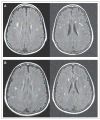Brain structure and function differences in monozygotic twins: possible effects of breast cancer chemotherapy
- PMID: 17761972
- PMCID: PMC3329758
- DOI: 10.1200/JCO.2007.10.8639
Brain structure and function differences in monozygotic twins: possible effects of breast cancer chemotherapy
Abstract
Purpose: Adjuvant chemotherapy has been associated with mild cognitive decline among a subset of breast cancer survivors. Late cognitive effects after chemotherapy can have a deleterious impact on survivor quality of life and functional health; however, the etiology of chemotherapy-related cognitive dysfunction remains unknown.
Patients and methods: We present a case of monozygotic twins who are discordant for breast cancer and chemotherapy exposure (ie, one twin contracted breast cancer and underwent chemotherapy, and the other had no breast cancer). As part of a larger study, each was evaluated with standardized, self-report measures of cognitive function, standard neuropsychological tests, and structural and functional magnetic resonance imaging (MRI).
Results: Results indicated small differences in neuropsychological test performance but striking contrasts in self-reported cognitive complaints and structural and functional MRI images. Specifically, the twin who underwent chemotherapy had substantially more subjective cognitive complaints, more white matter hyperintensities on MRI, and an expanded spatial extent of brain activation during working memory processing than her nonaffected twin.
Conclusion: This case illustrates possible physiologic mechanisms that could produce long-term cognitive complaints among chemotherapy recipients and help formulate hypotheses for further empirical study in the area of chemotherapy-associated cognitive dysfunction.
Conflict of interest statement
The author(s) indicated no potential conflicts of interest.
Figures


References
-
- Ferguson RJ, Ahles TA. Low neuropsychologic performance among adult cancer survivors treated with chemotherapy. Curr Neurol Neurosci Rep. 2003;3:215–222. - PubMed
-
- Minisini A, Atalay G, Bottomley A, et al. What is the effect of systemic anticancer treatment on cognitive function? Lancet Oncol. 2004;5:273–282. - PubMed
-
- Phillips KA, Bernhard J. Adjuvant breast cancer treatment and cognitive function: Current knowledge and research directions. J Natl Cancer Inst. 2003;95:190–197. - PubMed
-
- Ahles TA, Saykin AJ, Furstenberg CT, et al. Neuropsychologic impact of standard-dose systemic chemotherapy in long-term survivors of breast cancer and lymphoma. J Clin Oncol. 2002;20:485–493. - PubMed
-
- van Dam FS, Schagen SB, Muller MJ, et al. Impairment of cognitive function in women receiving adjuvant treatment for high risk breast cancer: High dose versus standard dose chemotherapy. J Natl Cancer Inst. 1998;90:210–218. - PubMed
Publication types
MeSH terms
Substances
Grants and funding
LinkOut - more resources
Full Text Sources
Other Literature Sources
Medical
Research Materials

